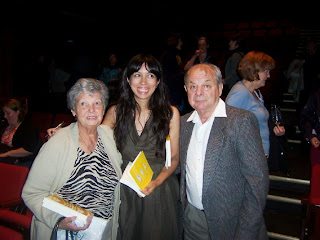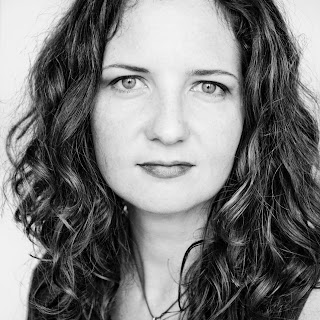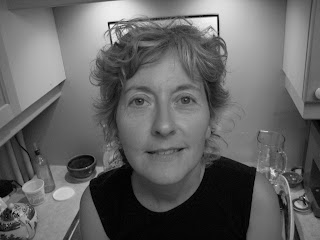 Ariel Gordon is the Winnipeg-based author of two recent small press poetry chapbooks. She is a regular contributor to the Winnipeg Free Press' books section and, each September, is Blogger-in-Chief of HOT AIR, the official blog of THIN AIR (i.e. the Winnipeg International Writers Festival). Her first full collection of poetry is slated for publication with Palimpsest Press in spring 2010.
Ariel Gordon is the Winnipeg-based author of two recent small press poetry chapbooks. She is a regular contributor to the Winnipeg Free Press' books section and, each September, is Blogger-in-Chief of HOT AIR, the official blog of THIN AIR (i.e. the Winnipeg International Writers Festival). Her first full collection of poetry is slated for publication with Palimpsest Press in spring 2010.So publishing the chapbook wasn’t a life-changing event, per se. But ask me again after the full collection comes out next year!
2 - How did you come to poetry first, as opposed to, say, fiction or non-fiction?
I actually came to fiction first, spending long hours composing a fantasy novel in the basement on my father’s ‘work’ computer when I was a pre-teen. He never used it, so I was able to spread out over the rudimentary hard drive, though I must say that it was heaps better than our first computer, a Vic 20.
I don’t quite remember when I started writing poetry, but by the time I started university I had settled into the habit of carrying a notebook with me wherever I went and, most importantly, scribbling madly in it.
Though poetry has been my dominant mode for years and years now, I still think of myself as writer rather than a poet. I’m not sure what that means, precisely, but that’s my negotiation.
3 - How long does it take to start any particular writing project? Does your writing initially come quickly, or is it a slow process? Do first drafts appear looking close to their final shape, or does your work come out of copious notes?
Some of the individual poems have jumped the fences, in that some of the how-to poems have revealed themselves as family poems and vice-versa, but it’s been sort of interesting to write both completely occasional poems (the occasion being that I want to write a poem) and completely focused, manuscript-driven poems. When it gets too emotionally difficult to continue working on the family poems, I can turn to the how-tos and when it gets boring writing one-offs, I can dive back into the manuscript.
Another interesting aspect to writing the how-to poems is that when I first started using it as a device last spring, the poems that emerged were sort of funny (How to Effectively Water Your Lawn and How to Sew a Button). Then I did a bunch of work on the family project, and when I returned to the how-tos, they weren’t funny any more. I’m not sure how to force myself to ‘write funny’ when the mood has passed, but I’ve learned two things about this writing life. One, wait long enough and everything will cycle back again and two, you can’t re-create a moment.
Working on what appears to be a tightly themed project also works around inspiration in interesting ways. I find I can work on it in bursts – it takes time to read and think my way in and I only have a limited time inside the project before my concentration breaks or the world intrudes. I had a period this spring where I was inside the project for two full weeks. And part of me was mourning even while in the midst of it because I had other writing obligations (nevermind the rest: house, child, job) that were taking me away from the family poems and I knew I wouldn’t get to stay there for very long.
Besides the age-old complaint of not enough time, when I’m editing the pieces that emerge I find that they accrue a kind of energy together and in my thinking of them that closely resembles inspiration. That feeling doesn’t necessarily help me write new poems but it does help me with the confidence needed to keep going, to know that there will be a next time inside the project, if I read and write and stay still long enough.
4 - Where does a poem usually begin for you? Are you an author of short pieces that end up combining into a larger project, or are you working on a "book" from the very beginning?
5 - Are public readings part of or counter to your creative process? Are you the sort of writer who enjoys doing readings?
I’m sort of a wobbly reader in that sometimes I’m perfectly comfortable and even reasonably assured and other times my knees jiggle uncontrollably. But I like the idea that someone’s listening, that my voice can do things with the words that the page maybe can’t do, so I’m striving to be more consistent in my performance.
6 – Do you have any theoretical concerns behind your writing? What kinds of questions are you trying to answer with your work? What do you even think the current questions are?
7 – What do you see the current role of the writer being in larger culture? Does s/he even have one? What do you think the role of the writer should be?
8 - Do you find the process of working with an outside editor difficult or essential (or both)?
Basically, I see the manuscript as a drum and I’m so looking forward to having someone pick it up and give it a good goddamn bang. I want to see what falls out, but most of all, I want to see how it sounds to someone whose ear I trust.
9 - What is the best piece of advice you've heard (not necessarily given to you directly)?
10 - How easy has it been for you to move between genres (poetry to fiction to critical prose)? What do you see as the appeal?
I haven’t written fiction in a long time but have recently contemplated returning to the half-finished novel I wrote before Anna was born. Realistically, it’ll have to wait until after she’s in school, because I don’t currently have blocks of time in which to immerse myself in it.
I see the reviews as exercizes. The fiction and poetry are wildly different modes of communicating, but at the bottom, they both attempt to convey thinking and feeling, some record of human endeavour.
11 - What kind of writing routine do you tend to keep, or do you even have one? How does a typical day (for you) begin?
12 - When your writing gets stalled, where do you turn or return for (for lack of a better word) inspiration?
13 - What fairy tale character do you resonate with most?
14 - David W. McFadden once said that books come from books, but are there any other forms that influence your work, whether nature, music, science or visual art?
15 - What other writers or writings are important for your work, or simply your life outside of your work?
In terms of writings, I’ve been reading quite a bit of what Tanis MacDonald recently dubbed historiographic metafiction of late: Jeanette Lynes’ It's Hard Being Queen: The Dusty Springfield Poems, Rob Winger's Muybridge's Horse, and Steven Price's Anatomy of Keys. Next up is Linda Frank’s Kahlo: The World Split Open.
16 - What would you like to do that you haven't yet done?
17 - If you could pick any other occupation to attempt, what would it be? Or, alternately, what do you think you would have ended up doing had you not been a writer?
It strikes me, at a distance of ten years from that decision, that writing poetry and writing journalism and being a scientist are all about having a good long look at the underpinnings of things, so maybe I’m still on plan.
18 - What made you write, as opposed to doing something else?
19 - What was the last great book you read? What was the last great film?
I also found the last couple of writer/mother anthologies – specifically, Double Lives: Writing and Motherhood (MQUP, 2008) and Great Expectations: Twenty-Four True Stories about Childbirth (Anansi, 2008) – quite useful.
I’m blanking on my last great film. Blankety-blank.
20 - What are you currently working on?
I’m also thinking of putting together an anthology of work generated for/through the May Day Poetry Project, an on-line writing space that’s in its fifth year.

_Colin_Rowe.jpg)



